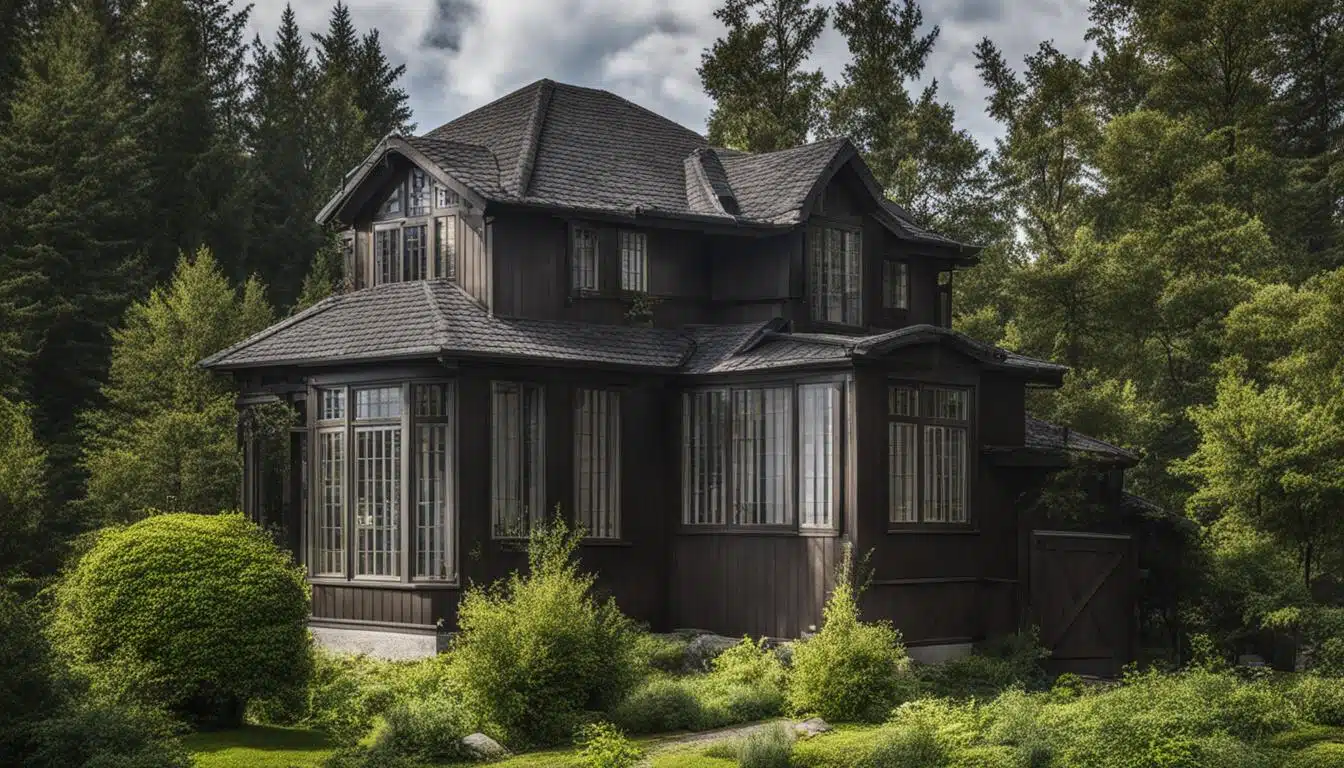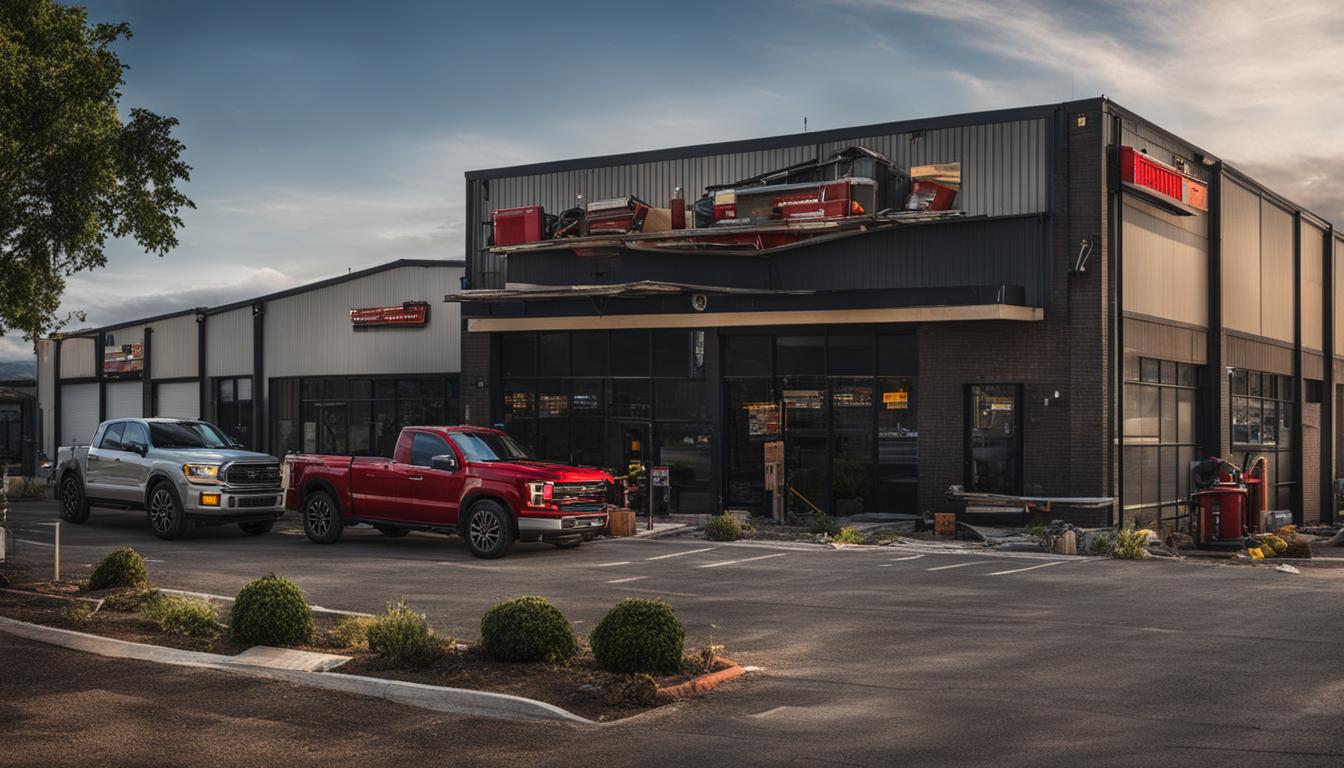Commercial property coverage plays a crucial role in safeguarding businesses and ensuring their growth and stability. It provides essential protection for a company’s physical assets, including buildings, equipment, inventory, and more. In this article, we will delve into the various layers of commercial property coverage, explore different insurance options, coverage types, and examine the role of insurance companies in providing comprehensive protection for business properties.
Key Takeaways:
- Commercial property coverage is vital for protecting a business’s physical assets.
- It safeguards against risks such as property damage, natural disasters, theft, and more.
- Commercial property insurance offers various coverage types, including property damage coverage and general liability coverage.
- Factors such as property type, location, and business industry can influence the cost of commercial property insurance.
- Business interruption insurance provides financial support during times of operational disruption.
Understanding Commercial Property Insurance
Commercial property insurance is a crucial safeguard for businesses, providing coverage for the physical assets they own. This includes buildings, equipment, inventory, and other property essential to their operations. With commercial property insurance, businesses can protect themselves against potential risks and losses.
There are different types of coverage available under commercial property insurance, each designed to address specific risks and provide financial protection. These types of coverage include:
- Property Damage Coverage: This type of coverage protects against damage to the business property caused by events like fire, vandalism, or theft.
- Business Interruption Insurance: Business interruption insurance provides coverage for lost income and ongoing expenses when a business is unable to operate due to a covered event.
- Liability Coverage: Liability coverage protects businesses from legal claims and expenses arising from injuries or damage caused to third parties on their property.
By having commercial property insurance in place, businesses can mitigate potential financial losses and ensure the continuity of their operations in the face of unforeseen circumstances.
Commercial property insurance protects businesses from potential risks and losses by providing coverage for their physical assets.
The Importance of Commercial Property Insurance
Business owners must recognize the importance of commercial property insurance in safeguarding their assets. Without proper protection, a business could face significant financial burdens and even bankruptcy in the event of a covered loss. Commercial property insurance provides the following benefits:
- Protection against Property Damage: From natural disasters to accidental damage, commercial property insurance protects businesses from costly property repairs or replacements.
- Financial Security during Business Interruptions: Business interruption insurance ensures that businesses can continue to cover their ongoing expenses and prevent a complete halt in operations.
- Peace of Mind and Confidence: Knowing that their assets are protected, businesses can focus on their growth and success, without the constant worry of potential losses.
With the right commercial property insurance coverage, businesses can face challenges head-on, knowing that their physical assets are adequately protected.
The Importance of Commercial Property Coverage
Commercial property coverage is a vital component in protecting your business’s physical assets. It provides the financial security you need to safeguard your business property from risks such as property damage, theft, natural disasters, and more. Without adequate insurance, these unforeseen events can significantly impact your company’s operations and disrupt your growth.
By investing in commercial property insurance, you can protect your business property and ensure that you have the necessary resources to recover from unexpected damage or loss. Insurance coverage provides financial support to repair or replace damaged property, helping you maintain business continuity and mitigate potential setbacks.
Whether you own a retail store, office space, or a manufacturing facility, commercial property insurance provides comprehensive protection for your physical assets. It covers the cost of repairing or rebuilding your property, replacing damaged equipment, and business insurance restoring essential infrastructure.
Why Do You Need Commercial Property Insurance?
Protecting your business property is crucial for the long-term success and stability of your company. Here are a few reasons why commercial property insurance is essential:
- Asset Protection: Insurance protects your company’s physical assets, including buildings, equipment, inventory, and supplies. It ensures that you property insured commercial property insurance pays national flood insurance program property kept many insurance companies
insurance terms individual insurance contracts can recover financially if these assets are damaged, stolen, or destroyed. - Liability Coverage: Commercial property insurance also provides liability coverage, protecting your business from legal claims if someone is injured on your property or if their property is damaged due to your business operations.
- Business Continuity: Having commercial property insurance ensures that you have the necessary resources to maintain your business operations in the face of unforeseen events. This can include covering costs associated with temporary relocation, equipment rentals, and ongoing expenses during the recovery period.
Whether you are a small business owner or manage a large corporation, causes of loss commercial property insurance is a fundamental part of protecting your investments and securing the future of your business.
See the table below for a comparison of how commercial property insurance protects your company’s physical assets:
| Protection Provided | Commercial Property Insurance | No Commercial Property Insurance |
|---|---|---|
| Property Damage | ✓ | ❌ |
| Business Interruption | ✓ | ❌ |
| Liability Coverage | ✓ | ❌ |
| Asset Replacement | ✓ | ❌ |
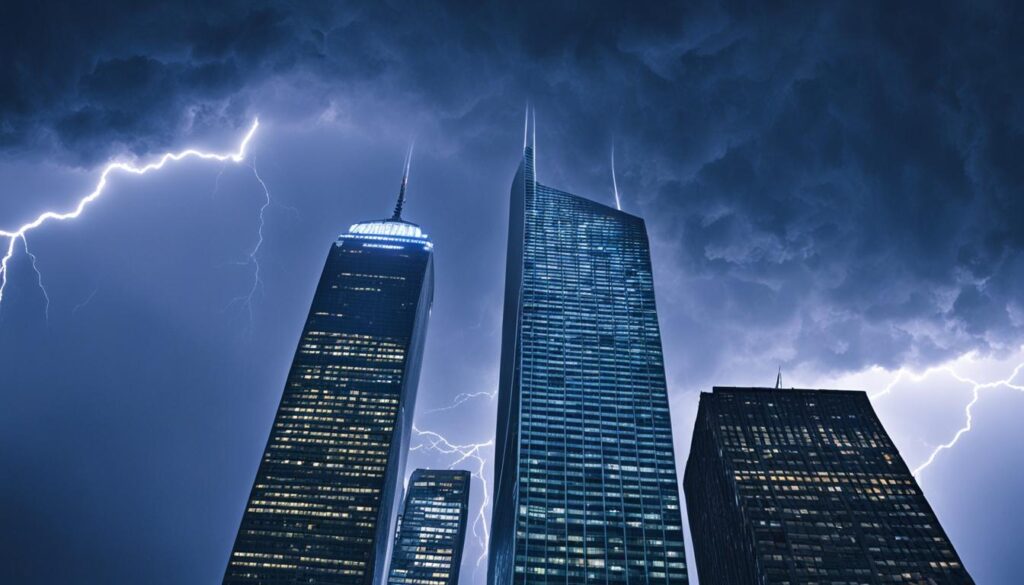
Commercial property coverage offers peace of mind by providing the necessary financial support to protect your assets and recover from unexpected incidents. Don’t leave your business vulnerable – explore the commercial property insurance options available and choose the policy that best suits your needs.
Factors Influencing Commercial Property Insurance Cost
When determining the cost of commercial property insurance, insurance companies take several factors into account. Understanding these factors can help you estimate the potential cost and ensure you have the appropriate coverage for your business.
Type of Property: The type of property being insured plays a significant role in determining the insurance cost. For example, insuring a warehouse may have different premium rates compared to insuring a retail store or an office building.
Location of the Property: The geographic location of your property can impact the insurance cost. Depending on the area’s history of natural disasters, crime rates, and other potential risks, insurance premiums may vary.
Value of the Property: The value of your property also affects the insurance cost. Higher-valued properties generally require higher insurance premiums due to property products insurance resources damaged business property insurance can be purchased commercial general liability the increased potential loss in case of damage or destruction.
Coverage Limits: The coverage limits you choose will influence the insurance cost. Higher coverage limits provide greater financial protection but may result in higher premium payments.
Level of Risk: The level of risk associated with your business or industry is an essential consideration for insurance companies. Industries with higher risks, such as manufacturing or construction, may have higher insurance premiums compared to lower-risk businesses.
By evaluating these factors, insurance companies determine the premiums for commercial property coverage, taking into account the potential risks and costs they may incur in case of a claim. It’s crucial to provide accurate and detailed information about insurance underwriters evaluate property insurance premiums commercial property insurance customers commercial risk purchase commercial property insurance property insurance to cover carry property insurance insurance to protect property and liability coverage property insurance for your business covered under commercial property insurance your property and business to ensure you receive appropriate coverage at a fair price.

Types of Coverage in Commercial Property Insurance
Commercial property insurance offers a range of coverage options to cater to the specific needs of different businesses. Here are some key types of coverage that are commonly included in commercial property insurance policies:
- Property Damage Coverage: This type of coverage protects against damage to buildings and equipment owned by the business. It safeguards your business property from risks such as fire, vandalism, and natural disasters.
- General Liability Coverage: General liability coverage provides protection in the event of third-party injuries or property damage that may occur on your business premises. It helps cover legal expenses and compensation costs.
Additionally, businesses have the option to add extra coverage to their commercial property insurance policy:
- Business Interruption Insurance: This coverage compensates for income loss and ongoing operating expenses when a covered event, such as a fire or natural disaster, interrupts your business operations.
- Extra Expense Coverage: Extra expense coverage reimburses the additional costs incurred to continue business operations after a covered event. It can cover expenses such as renting temporary premises or leasing equipment.
By understanding the different types of coverage available, businesses can tailor their commercial property insurance policies to provide comprehensive protection for their properties and mitigate potential risks.
“Commercial property insurance offers a range of coverage options to cater to the specific needs of different businesses.”
| Types of Coverage | Covered Risks |
|---|---|
| Property Damage Coverage | Fire, vandalism, natural disasters |
| General Liability Coverage | Third-party injuries, property damage |
| Business Interruption Insurance | Income loss, ongoing expenses during interruptions |
| Extra Expense Coverage | Addition costs to continue operations after an event |
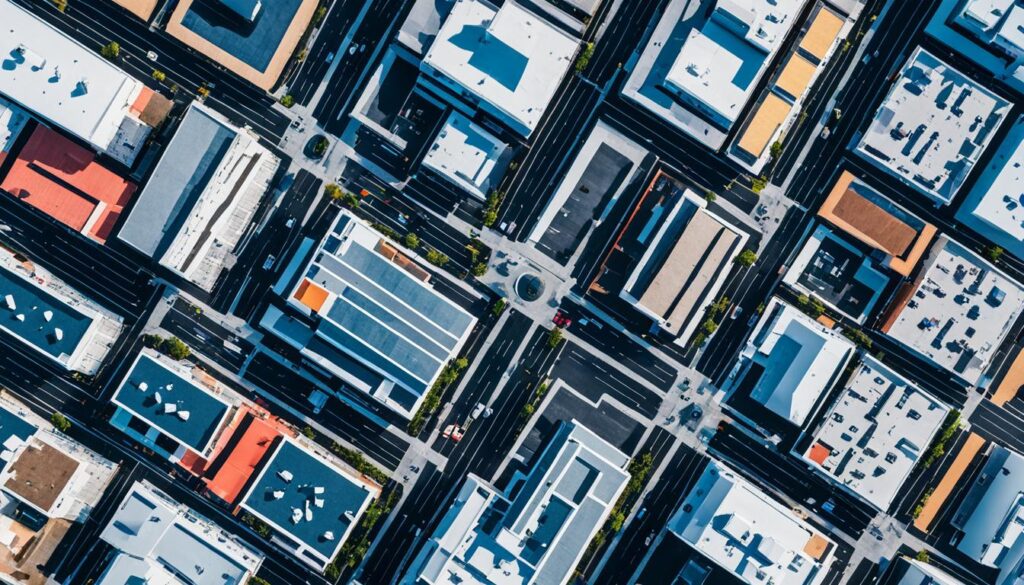
Understanding Replacement Cost vs. Actual Cash Value
When it comes to commercial property coverage, it’s important to understand the difference between replacement cost and actual cash value. These terms have a significant impact on the coverage and premiums of commercial property insurance policies.
Also Read:- Guarding Your Assets: Navigating The Landscape Of Business Property Insurance
Replacement cost coverage offers a higher level of protection by reimbursing the cost of replacing damaged or lost property with new property of similar kind and quality. This means that if your business property is damaged or destroyed, the insurance company will cover the expense of replacing it with a brand-new item that is equivalent in size, features, and functionality. For example, if a fire damages your office building, replacement cost coverage will help you rebuild it to its previous state.
On the other hand, actual cash value (ACV) coverage takes into account depreciation when determining the value of your property at the time of loss. In the event of a claim, the insurance company will pay you the fair market value of the property at that time, taking into consideration its age, wear and tear, and current condition. ACV coverage provides a reimbursement that reflects the value of the property as it depreciates over time.
The choice between replacement cost and actual cash value coverage depends on the specific needs and circumstances of your business. While replacement cost coverage offers more comprehensive protection, it typically comes with higher premiums. Actual cash value coverage, on the other hand, may be a more affordable option but may not fully reimburse you for the cost of replacing your property with new items.
Key Differences between Replacement Cost and Actual Cash Value
To further understand the contrast between replacement cost and actual cash value, here’s a comparison table:
| Replacement Cost Coverage | Actual Cash Value Coverage |
|---|---|
| Reimburses the cost of replacing damaged or lost property with new property of similar kind and quality. | Pays the current value of the property at the time of loss, accounting for depreciation. |
| Higher premiums. | Premiums generally lower compared to replacement cost coverage. |
| Offers more comprehensive protection. | May not fully reimburse the cost of replacing the property with new items. |
Choosing between replacement cost and actual cash value coverage is a crucial decision that should be based on the value of your business property, your budget, and your risk tolerance. It’s recommended to consult with an experienced insurance agent who can assess your specific needs and provide guidance on the best coverage option for your business.
Business Interruption Insurance and Its Benefits
Business interruption insurance is a critical component of commercial property coverage. It provides financial support to businesses when their operations are temporarily disrupted due to covered events, such as natural disasters.
This insurance covers loss of income, ongoing operating expenses, and other costs associated with the interruption. In times of unexpected challenges, business interruption insurance helps businesses remain afloat and ensures the continuity of their operations.
When an unexpected event, such as a fire or a flood, forces a business to temporarily close its doors, it can lead to significant financial losses. Business interruption insurance helps mitigate these losses by providing coverage for the income that would have been earned during the closure period.
“Business interruption insurance can help bridge the financial gap caused by a temporary shutdown, allowing businesses to continue paying bills, employee salaries, and other necessary expenses,” explains Robert Johnson, a commercial insurance expert.
This insurance also covers ongoing expenses that businesses may still incur even when operations are suspended, such as rent, utilities, and loan payments. These expenses can quickly add up and put a strain on a business’s finances, but business interruption insurance provides the necessary financial support to manage these costs and ensure the business can resume normal operations as quickly as possible.
Benefits of Business Interruption Insurance
Business interruption insurance offers several benefits to businesses facing temporary disruptions:
- Protection against loss of income: Business interruption insurance covers the income that a business would have earned during the closure period. This ensures that the business can continue to meet its financial obligations and maintain cash flow during the interruption.
- Continuation of ongoing expenses: This insurance covers ongoing expenses that businesses may still incur, such as rent, utilities, and loan payments, even when operations are temporarily halted. By providing financial support for these expenses, business interruption insurance helps keep the business running smoothly.
- Assistance with recovery: Business interruption insurance can help businesses recover more quickly from a temporary shutdown. The financial support provided allows businesses to focus on getting back on their feet and resuming normal operations as soon as possible.
It’s important for businesses to assess their risks and consider the potential impact of an interruption on their operations. By obtaining business interruption insurance, businesses can protect themselves against the financial consequences of unexpected events and ensure their long-term sustainability.
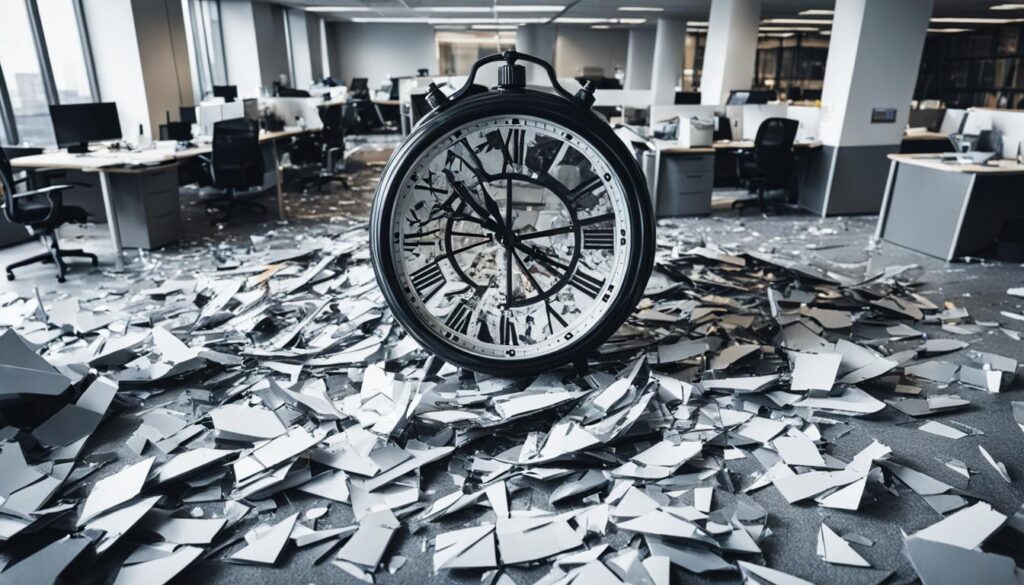
How to Shop for Commercial Property Insurance
When it comes to shopping for commercial property insurance, it’s crucial to take into account your business’s specific needs and risks. This ensures that you secure the right coverage to protect your valuable assets. An experienced insurance agent can be an invaluable resource in helping you navigate the complex world of commercial property insurance. They will assess your requirements, evaluate various insurance policies, and guide you in determining the best coverage options for your business.
Comparing quotes from different insurance companies is essential to ensure you find the best commercial property insurance that fits your budget. It’s also vital to thoroughly understand the policy terms and conditions to avoid any surprises in the event of a claim. Take the time to review the coverage limits, deductibles, exclusions, and any additional endorsements or riders that may be offered. By carefully considering all these factors, you can make an informed decision that aligns with your business’s unique insurance needs.
Key Considerations When Shopping for Commercial Property Insurance
- Assess your business’s assets and risks: Take stock of your commercial property, including buildings, equipment, inventory, and any other assets that require coverage. Identify the potential risks and hazards that your property may face, such as natural disasters, theft, vandalism, or fire.
- Work with an experienced insurance agent: Seek the guidance of an insurance agent who specializes in commercial property insurance. They have the knowledge and expertise to help you navigate the insurance market and find the coverage that best suits your business.
- Get multiple quotes: Obtain quotes from different insurance companies to compare coverage options and premiums. This allows you to make an informed decision based on your budget and the level of coverage you require.
- Review policy terms and conditions: Carefully read and understand the policy terms and conditions, including coverage limits, deductibles, and any exclusions or limitations. Ask your insurance agent to explain any terms or provisions that you find confusing.
- Consider additional coverage options: Depending on your business’s needs, you may want to explore additional coverage options. This could include business interruption insurance, equipment breakdown coverage, or cyber liability insurance. Determine if these coverages are necessary to adequately protect your business.
- Evaluate the insurance company’s reputation and financial stability: Research the insurance company’s reputation and financial stability. Look for customer reviews and ratings from independent rating agencies to ensure that the company has a solid track record for customer service and claims handling.
Shopping for commercial property insurance may seem overwhelming, but with the right guidance and understanding of your insurance needs, you can find the coverage that safeguards your business’s assets. Take the time to work closely with an experienced insurance agent, compare quotes, and review policy terms and conditions to make an informed decision. By investing in the right commercial property insurance, you can have peace of mind knowing that your business is protected.

Working with an experienced insurance agent is essential when shopping for commercial property insurance. They can help you assess your specific insurance needs, evaluate policies, and guide you in finding the right coverage for your business.
Additional Coverage Options for Commercial Property Insurance
In addition to standard commercial property coverage, businesses have the opportunity to enhance their insurance protection with various additional coverage options. These options are designed to address specific risks and provide comprehensive coverage tailored to the unique needs of different businesses.
Coverage Package Policies
One popular approach is to purchase a commercial package policy that combines different types of coverage into one comprehensive insurance package. These policies are customizable, allowing businesses to choose the specific coverages they need. By bundling multiple coverages together, businesses can often benefit from cost savings and more streamlined policy management.
Inland Marine Insurance
Inland marine insurance is another supplementary coverage option that can benefit businesses with property that is frequently on the move or transported. This type of coverage protects against property damage or loss during transportation and is particularly relevant for businesses involved in shipping, logistics, or construction.
Equipment Breakdown Insurance
Equipment breakdown insurance offers protection for businesses that heavily rely on machinery and equipment. From manufacturing plants to restaurants, equipment breakdown insurance covers the cost of repairing or replacing damaged equipment due to mechanical or electrical breakdowns.
Cyber Liability Insurance
In today’s digital age, businesses face increasing threats from cyberattacks and data breaches. Cyber liability insurance provides coverage for financial losses and legal expenses resulting from cyber incidents. This includes data breaches, hacking, ransomware attacks, and other cyber-related risks that can potentially disrupt business operations and compromise sensitive customer information.
By exploring these additional coverage options, businesses can strengthen their commercial property insurance and safeguard their assets against a wider range of potential risks and losses.
| Additional Coverage Option | Description |
|---|---|
| Coverage Package Policies | Combines different types of coverage into one comprehensive insurance package. |
| Inland Marine Insurance | Protects property during transportation and is ideal for businesses involved in shipping, logistics, or construction. |
| Equipment Breakdown Insurance | Covers repair or replacement costs for damaged machinery and equipment. |
| Cyber Liability Insurance | Provides coverage for financial losses and legal expenses resulting from cyber incidents and data breaches. |
By leveraging these additional coverage options, businesses can fortify their commercial property insurance and ensure comprehensive protection for their valuable assets.
Understanding Losses Not Covered by Commercial Property Insurance
Commercial property insurance provides valuable coverage for a wide range of risks faced by businesses. However, it’s important to be aware of the limitations and exclusions of your policy to ensure you have the necessary protection for your property. While each policy is unique, there are common types of losses that are generally not covered by commercial property insurance.
Intentional Acts
Commercial property insurance generally does not cover damages resulting from intentional acts. This means that if someone intentionally causes damage to your property, the insurance company may not provide coverage for the repairs or replacement.
Wear and Tear
Normal wear and tear is another example of losses that are typically excluded from commercial property insurance coverage. Over time, properties naturally deteriorate, and insurance policies are designed to protect against sudden and unforeseen damage rather than the expected wear and tear.
Excluded Natural Disasters
While commercial property insurance covers many types of natural disasters, there are certain events that may be excluded from coverage. These can vary depending on the specific policy and location, but may include floods, earthquakes, and hurricanes. It’s crucial to review your policy and consider purchasing additional coverage for these specific risks if necessary.
Specific Exclusions
Insurance policies often contain specific exclusions for certain types of property. For example, certain high-risk items such as cash, jewelry, or fine art may have coverage limitations or require separate policies. Make sure to carefully review your policy to understand any exclusions that may apply to your property.
It’s crucial to review the terms and conditions of your commercial property insurance policy to ensure you have a clear understanding of what is and isn’t covered. By being aware of the potential losses that are not covered, you can take appropriate measures to protect your property and mitigate potential risks.
Remember, each insurance policy is unique, and the specific coverage and exclusions can vary. It’s important to consult with your insurance agent or provider to fully understand the terms of your commercial property insurance and explore additional coverage options if needed.
Image:
The Importance of Proof of Commercial Property Coverage
Businesses need to provide proof of commercial property coverage to ensure they have adequate insurance in place to protect their physical assets. This proof can be presented through an insurance page or policy document, clearly outlining the coverage limits, types of coverage, and other relevant details.
Having proof of commercial property coverage is crucial for demonstrating to business owners, clients, and stakeholders that the company’s physical assets are adequately protected. It provides peace of mind and reassurance that the business is prepared for unexpected events that may cause damage or loss.
Insurance protects your company’s physical assets, ensuring that in case of property damage, natural disasters, theft, or other risks, you have financial support to recover and replace the damaged or lost assets. Commercial property coverage is essential for the long-term stability and growth of your business.
By having a documented insurance page or policy document, you can easily provide evidence of coverage to interested parties, such as lenders, business partners, or government regulators. This proof of commercial property coverage also helps strengthen your business’s reputation and instill confidence in potential clients or investors.
When creating an insurance page or policy document, it’s important to include clear and concise information. Use headings and subheadings to separate key sections, and consider using a table to present detailed coverage information in a visually appealing way:
| Policy Number | Coverage Limits | Types of Coverage |
|---|---|---|
| ABC123 | $1,000,000 | Property Damage Coverage |
| Business Interruption Insurance | ||
| General Liability Coverage |
Having a well-documented insurance page or policy document that clearly outlines your commercial property coverage helps ensure that there are no misunderstandings or disputes regarding the scope of your insurance. It also provides a reference point for any claims or inquiries related to your coverage.
Investing in commercial property insurance and providing proof of coverage is a proactive step that demonstrates your commitment to protect your company’s physical assets. Insurance protects your business from potential financial losses that could jeopardize its operations and future. Don’t underestimate the importance of having proof of commercial property coverage to safeguard your business’s stability and growth.
Conclusion
In conclusion, commercial property coverage is crucial for protecting your business’s physical assets and ensuring its stability and growth. By understanding the various types of coverage available, such as property damage coverage, business interruption insurance, and liability coverage, you can tailor your insurance policy to meet the specific needs of your business. Working with an experienced insurance agent who can assess your requirements and guide you through the process is essential.
With the right commercial property insurance coverage in place, you can protect your assets from risks such as property damage, natural disasters, theft, and other unforeseen events. This financial protection allows you to focus on running your business with the confidence that your physical assets are safeguarded. It is important to review your policy regularly to ensure it aligns with your current business needs and make adjustments as necessary.
Don’t wait until disaster strikes to realize the importance of commercial property coverage. Protecting your business property is an essential step towards securing the future of your company. By investing in comprehensive insurance coverage, you are safeguarding your assets, minimizing financial risks, and creating a solid foundation for the continued success of your business.
FAQ
What is commercial property insurance?
Commercial property insurance is a type of insurance that provides coverage for physical assets owned by a business.
Why is commercial property coverage important?
Commercial property coverage is crucial for protecting a business’s physical assets and ensuring its stability and growth.
What factors influence the cost of commercial property insurance?
The cost of commercial property insurance can vary and is influenced by factors such as the type of property, location, value, coverage limits, and business or industry risks.
What types of coverage are available in commercial property insurance?
Types of coverage in commercial property insurance include property damage coverage, general liability coverage, business interruption insurance, and additional coverage options.
What is the difference between replacement cost and actual cash value?
Replacement cost coverage reimburses the cost of replacing damaged or lost property with new property, while actual cash value coverage pays the current value of the property, accounting for depreciation.
What is business interruption insurance and why is it important?
Business interruption insurance provides financial support to businesses when their operations are temporarily disrupted due to covered events. It covers loss of income and ongoing expenses, helping businesses remain afloat during challenging times.
How can I shop for commercial property insurance?
To shop for commercial property insurance, work with an experienced insurance agent who can assess your business’s needs and help determine the best coverage options. Comparing quotes and understanding policy terms and conditions is also important.
Are there additional coverage options for commercial property insurance?
Yes, businesses can opt for additional coverage options such as a commercial package policy, inland marine insurance, equipment breakdown insurance, and cyber liability insurance to further protect their assets.
What losses are not covered by commercial property insurance?
Commercial property insurance generally does not cover intentional acts, wear and tear, damage caused by certain natural disasters, or specific types of property excluded from the policy.
Why is proof of commercial property coverage important?
Proof of commercial property coverage is vital for businesses to demonstrate that they have adequate insurance in place to protect their physical assets.


